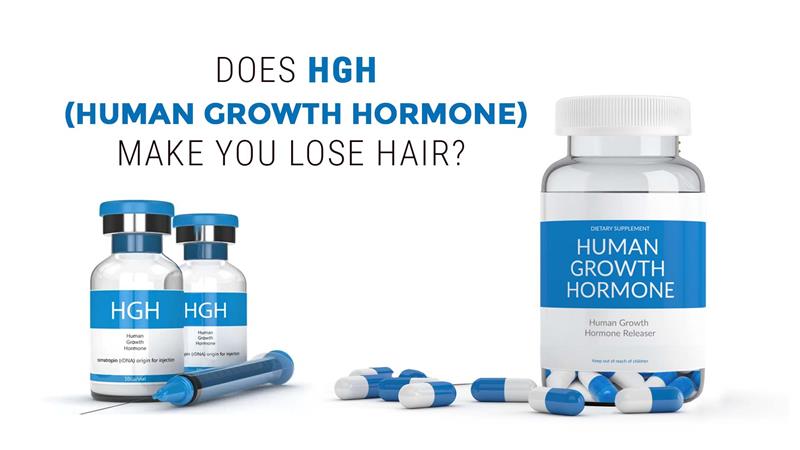Most people can rattle off the basics of HGH—muscle mass, fat metabolism, athletic performance—but when the conversation shifts to hair, things get oddly quiet. Suddenly, you’re bombarded with vague Reddit threads, wellness blogs high on anecdotes, and haircare sites that oversell the idea that one hormone alone can make or break your hairline. And just like that, “Does HGH make you lose hair?” becomes more confusing than clarifying.
Now here’s where things get a little hairy (literally). HGH (Human Growth Hormone) isn’t some random hormone floating around on a whim. It’s central to cell regeneration, tissue repair, and yes, hair growth. Without it, your follicles can’t stay in the anagen (growth) phase for long. But does that mean flooding your system with it gives you shampoo-commercial locks? Not quite. The relationship between HGH and hair growth is far less Instagram-friendly than some would like you to believe.
There’s also this awkward middle ground. People on HGH replacement therapy or anti-aging programs sometimes report hair fall instead of hair gain. Some even panic and pull the plug too soon—blaming HGH before understanding what’s actually happening beneath the scalp. The problem is… hair follicles are hormone-sensitive creatures. And like most things hormonal, context is everything.
This blog breaks that context wide open. We'll dig into real research, discuss why growth hormone gets both praise and blame in hair health circles, and clear the air around what's fact, what’s overhyped, and what your follicles actually care about.
What Is HGH & How It Affects Hair?
Human Growth Hormone (HGH) is produced by your pituitary gland and plays the role of the body’s cellular general contractor—regulating growth, metabolism, tissue repair, and, yes, your precious hair follicles. But it doesn’t work alone. HGH nudges the liver to release IGF-1 (Insulin-like Growth Factor 1), which helps stimulate cell proliferation, including in your hair's anagen (growth) phase.
Now, here’s where things get layered. A healthy HGH level tends to support normal hair growth cycling. Low HGH has been linked to premature aging symptoms, including thinning hair. On the flip side, excessive HGH—like in acromegaly—can cause unwanted hair growth (often in places you didn’t ask for), not balding. Which means more fuzz on your arms but not necessarily a fuller crown.
So, growth hormone and hair growth are tied together—but it’s all about balance. It’s not just how much you have, but what your body does with it. And frankly, pushing HGH too far can send your hair (and your hormones) in directions you didn’t sign up for.
Can HGH Cause Hair Loss?
There’s no solid evidence linking HGH therapy to actual, permanent hair loss. In fact, several studies suggest HGH supports hair growth in people who are deficient in it. In short: If you’re low on HGH, supplementing may help—provided everything else is in check.
That said, some users report hair shedding in the early phases of HGH use. But don’t panic—this is more of a “hormonal shuffle” than an exit plan. Just like with finasteride or thyroid meds, any abrupt hormonal shift can cause a temporary telogen effluvium (a term for “hair falling out faster than it should for a while”). It’s unsettling, but often short-lived.
Mechanistically speaking, the HGH-IGF-1 axis can tweak hair cycle timing. A sudden surge may bump more follicles into the resting (telogen) phase, leading to increased shedding. But again—this isn’t hair death. It’s more of a hormonal reshuffle before the regrowth gears up.
How to Treat Hair Changes Due to HGH?
-
Speak with an endocrinologist or dermatologist to pinpoint if HGH is the real culprit behind your hair woes.
-
Monitor hormone levels regularly if you're on HGH therapy—especially IGF-1, thyroid, and androgens.
-
Rule out other causes, like iron deficiency, stress, or underlying autoimmune conditions.
-
Opt for gentle, scalp-friendly products to limit further irritation during shedding phases.
-
Work with your doctor to adjust HGH dosage if side effects persist or worsen.
-
Consider adjunct treatments like topical minoxidil, oral finasteride (if appropriate), PRP therapy, or LPT (laser phototherapy) for targeted follicle support.
Common Myths About HGH and Hair
Myth: “HGH will make you bald.”
Reality: For people who are HGH-deficient, it often supports healthier, stronger growth. Excess may cause temporary shedding or body hair changes, not baldness.
Myth: “More HGH = thicker hair.”
Reality: Overdosing won’t get you a fuller mane. Too much HGH can disrupt your hair cycle, lead to paradoxical shedding, or cause odd patches of growth where you didn’t intend.
When to See a Doctor?
If you’ve recently started HGH therapy and your hair is falling faster than your patience, it’s time to consult a specialist. Sudden shedding, especially within the first few months, may indicate your hormones are adjusting—or reacting poorly.
And if you notice unexpected hair growth on your arms, face, or chest while your scalp thins out, your body might be distributing growth signals unevenly. The right physician can help dial in the right balance to avoid further follicular confusion.
Conclusion
Let’s set the record straight—HGH doesn’t usually cause hair loss. If anything, it may help improve growth in those with a deficiency. That said, spiking HGH levels too fast or too high can lead to temporary shedding or unwanted body hair. It’s less about the hormone itself and more about how (and why) it’s being used.
For healthy hair, balance is non-negotiable. Whether you're on HGH therapy or considering it, keeping tabs on your hormone levels and working with medical professionals is key. And if you’re still battling thinning or shedding, science-backed tools like Theradome laser phototherapy device may give your follicles what they need.






















